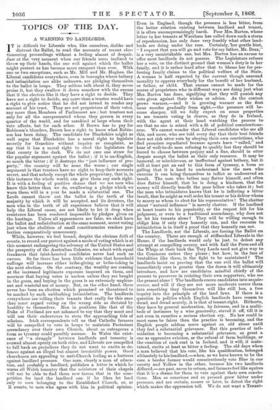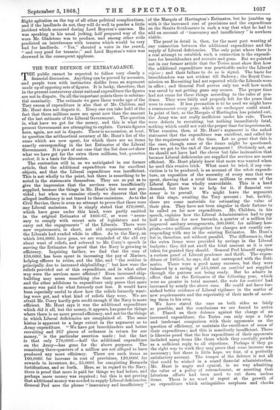TOPICS OF THE DAY.
A WARNING TO LANDLORDS.
iT is difficult for Liberals who, like ourselves, dislike and distrust the Ballot, to read the accounts of recent elec- tioneering proceedings without a feeling almost of despair. Just at the very moment when our friends seem inclined to throw up their hands, the one evil against which the ballot might protect us has become more rampant than ever. With one or two exceptions, such as Mr. Mill and Mr. Hughes, the Liberal candidates everywhere, even in boroughs where bribery and intimidation are alike unknown, are pledging themselves to the ballot in heaps. They seldom talk about it, they never praise it, but they swallow it down somehow with the excuse that if the electors like it they have a right to decide. They have not a right to decide, any more than a trustee would have a right to give notice that he did not intend to render any account of his trust. They are not proprietors of their votes, any more than Members of Parliament are ; but trustees not only for all the unrepresented whom they govern in every quarter of the world, and for mankind at large whom their vote affects, but for each other. If Brown has to pay for Robinson's blunders, Brown has a right to know what Robin- son has been doing. The candidate for Blankshire might as well argue that Blankshire has a moral right to legislate secretly for Grasshire without inquiry or complaint, as say that it has a moral right to elect the legislators for that county in the dark. We do not care one straw for the popular argument against the ballot ; if it is un-English, so much the better ; if it destroys the "just influence of pro- perty," the country will be none the worse ; our single argument is that trustees have no right to keep their accounts secret, and that nobody except the whole proprietary, that is, in this instance the whole world, can give them any such right. It is with a feeling of positive shame that we see men who know this better than we do, swallowing a pledge which we warn them will in a year be made a substantial one. The Lords cannot throw out the ballot in the teeth of the majority by which it will be accepted, and its devotees, the men who in the teeth of all experience believe that it will help the Liberal cause, are not likely to let it drop when resistance has been rendered impossible by pledges given on the hustings. Unless all appearances are false, we shall have the ballot and redistribution at the same moment, secret voting just when the abolition of small constituencies renders pro- tection comparatively unnecessary.
While, however, we feel bound, despite the obvious drift of events, to record our protest against a mode of voting which is at this moment endangering the solvency of the United States and the prosperity of the Australian Colonies, we admit with equal frankness that faint-hearted candidates never had such an excuse. So far there has been little evidence that household suffrage will increase either bribe-giving or bribe-taking in the next election. On the contrary, the wealthy are craning at the increased legitimate expenses imposed on them, and murmur that buying votes is useless unless they are bought in the gross, and buying in the gross is an extremely unpleas- ant and wasteful use of money. But, on the other hand, there never has been an election which promised or threatened to be marked by such unblushing intimidation. The landlords everywhere are telling their tenants that really for this once they must regard voting on the wrong side as dictated by hostility to themselves. Men in positions like that of the Duke of Portland are not ashamed to say that they must and will use their endeavours to stem the approaching tide of atheism. Irish correspondents tell us that Catholic farmers will be compelled to vote in heaps to maintain Protestant ascendancy over their own Church, about as outrageous a form as tyranny could possibly assume. In Wales the exist- ence of "a struggle" between landlords and tenantry is avowed almost openly on both sides, and Liberals are compelled to fall back on prejudices they do not want to excite as de- fences against an illegal but almost irresistible power. Good churchmen are appealing to anti-Church feeling as a buttress against landlord pressure. One man, clearly a man of educa- tion, and probably a landlord, publishes a letter in which he warns all Welsh tenantry that the ministers of their chapels will not be able to find them new farms, that in the com- petition for land the landlord can if he likes let land only to men belonging to the Established Church, or, at
Even in England, though the pressure is less bitter, from the better relation existing between landlord and tenant, it is often uncompromisingly harsh. Poor Mrs. Burton, whose letter to her tenants at Wareham has called down such a storm of reprehension, has only done very frankly what other land- lords are doing under the rose. Certainly, her gentle hint, "I request that you will go and vote for my father, Mr. Drax,'" is a very unmistakable one, but Mrs. Burton has an excuse to, offer most landlords do not possess. The Legislature refuses her a vote, on the distinct ground that woman's duty is to her family, and it is rather hard after that to blame her for pre- ferring family claims to the political welfare of the State- A woman is half expected by the current though unsound morality to oppress everybody for the benefit of her husband,. or father, or child. That excuse cannot be made for the scores of proprietors who in different ways are doing just what Mrs. Burton has done, signifying that they will punish any- vote given against their wishes or advice. As the contest grows warmer,—and it is growing warmer as the first issue recedes gradually from sight,—the pressure will be- come sharper, till we fully expect on some properties to see tenants voting in droves, as they do in Ireland, with the agent at their head watching the process to. see that no one is seized with a fit of political conscientious- ness. We cannot wonder that Liberal candidates who see all this, and more, who are told every day that their best friends. dare not risk utter ruin by obeying their own convictions, who. find promises repudiated because agents have "called," and hear of well-to-do men refusing to qualify lest they should be forced to choose between perjury and a fine, should in utter despair accept the ballot as their only resource. It may be immoral, or mischievous, or ineffectual against bribery, but it. willat least put an end to this form of tyranny, a form so galling that it is hard to understand how the men who. exercise it can bring themselves to inflict so undeserved an insult. The man who bribes may flatter himself, and often does flatter himself, that he is doing a kindness, that the money will directly benefit the poor fellow who takes it ; but the man who intimidates knows that he is inflicting a bitter insult, that he might as well order his tenant or his debtor whom to marry as whom to elect for his representative t The chatter about "natural influence" is merely chatter. If the landlord at heart trusts to his popularity, or the respect felt for his judgment, or even to a traditional ascendancy, why does not he let his tenants alone? They will be willing enough to- oblige him if only they honestly can, and the recourse to. intimidation is in itself a proof that they honestly can not.
The Landlords, not the Liberals, are forcing the Ballot on the country. There are enough of stiffnecked Liberals in the House, if the landlords would only be just, to defeat any attempt at compelling secrecy, and with half the Press and all the Whigs at their back the Tory Lords need not give way to- the Commons unless they please ; but how, in the face of brutalities like these, is the fight to be maintained? The landlords insist on proving that the one evil the ballot will immediately cure is greater than the dozen it will ultimately introduce, and how are candidates mindful chiefly of the. present to persevere in resisting their own supporters, who see- the present alone ? The landlords coerce candidates into acquie- scence, and will if they are not more moderate coerce them into something they themselves will like still less, a free inquiry into the principle of the land laws. If there is a. question in politics which English landlords have reason to dread, and dread acutely, it is that of tenant-right. Hitherto, they have by general moderation, by fairness, and in a multi- tude of instances by a wise generosity, staved it off, till it is not even in counties a serious election cry. No law could in. most cases be fairer than the practice is becoming, and the English people seldom move against an old abuse until they feel a substantial grievance. But this practice of inti- midation is becoming a substantial grievance, as great a. one as oppressive eviction, or the refusal of farm buildings, or the exaction of rack rent is in Ireland, and it will, if main- tained, excite at least as bitter a feeling. The old days when a man believed that his vote, like his qualification, belonged ultimately to his landlord,—when, as we have known to be the case, a border farmer would conscientiously vote Blue in one county and Yellow in the other, because his two landlords differed,—are past, never to return, and farmers feel like squires that it is a shame for them to vote against their own convic- tions. Men so conscious and so pressed grow bitter under pressure, and are certain, sooner or later, to detest the right.
Eight agitation on the top of all other political complications, and if the landlords do not, they will do well to ponder a little incident which occurred during Lord Royston's canvass. He was speaking in his usual jerking, half prepared way of the woes Mr. Gladstone was to produce, and among other evils predicted an interference with tenures which would be very bad for landlords. "Yes," shouted a voice in the crowd, "and very good for tenants ;" and Lord Royston's voice was .drowned in the consequent applause.































 Previous page
Previous page